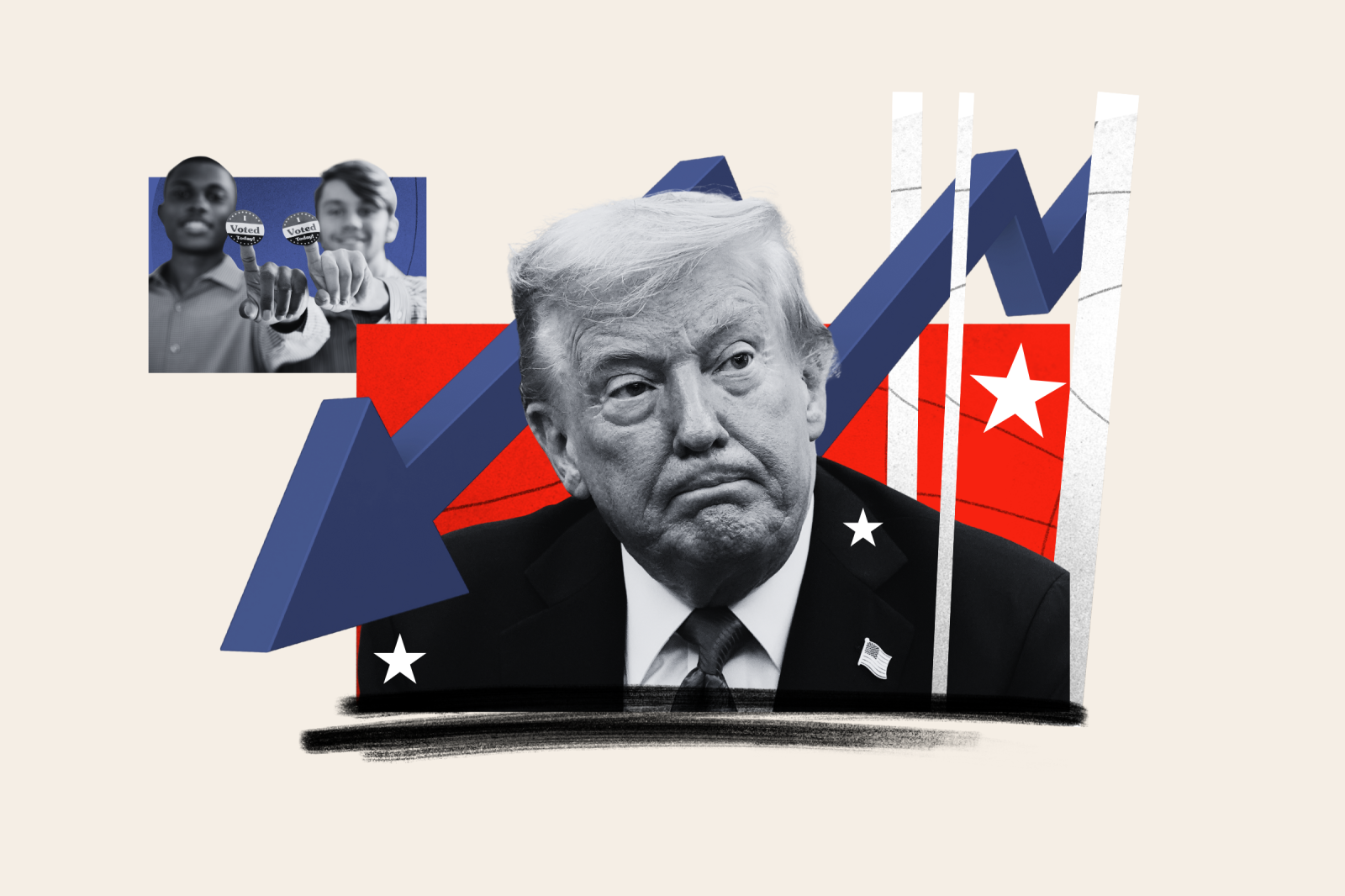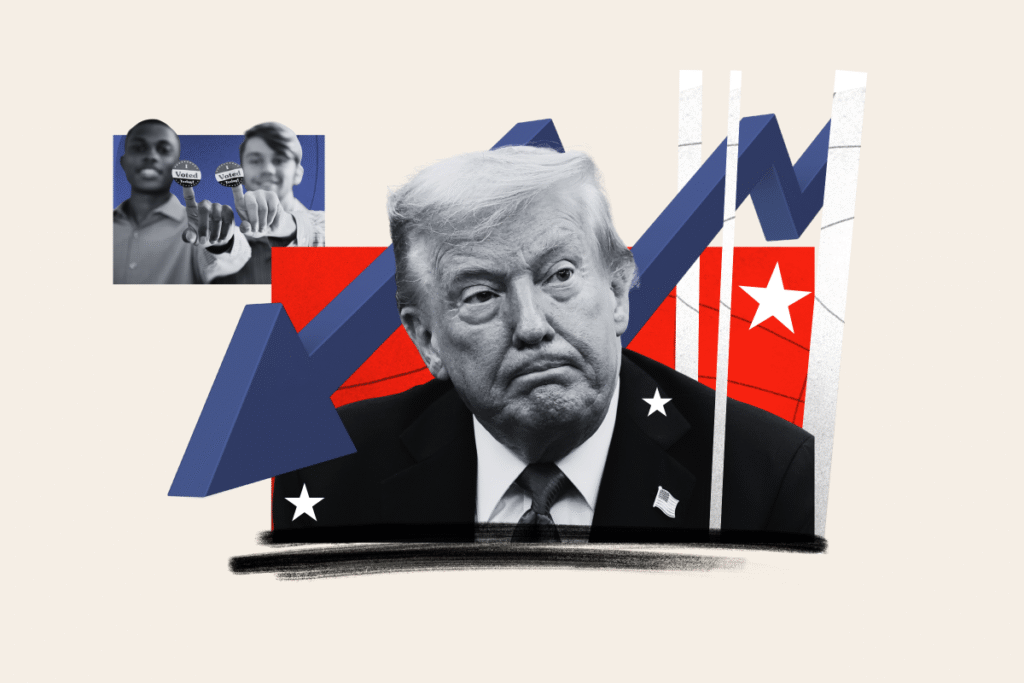President Donald Trump is losing support among the very groups that fueled his 2024 electoral gains, according to new polling.
A Marist survey released this week shows sharp declines in Trump’s standing with Gen Z, Latino, and Black voters since June. Among Black voters, Trump’s support fell from -42 in June to -53 now, while his backing among Latinos slipped from -5 to -16. Gen Z, once considered a surprising area of growth for Trump, has shifted dramatically against him, with support falling from -22 to -38.
The drop-off is particularly significant because these demographic groups helped power Trump’s stronger-than-expected showing in the 2024 election, where he cut into Democratic margins with younger and nonwhite voters.
In 2020, Democrats won Gen Z voters by 25 points (61–36), Black voters by 83 points (91–8), and Latino voters by 28 points (63–35), according to AP VoteCast. Four years later, Trump significantly cut into those margins: Gen Z split almost evenly at 51–47, Black voters shifted to 83–16, and Latinos narrowed to 55–43. Those swings represented some of the largest demographic shifts of the election, with Democrats’ Gen Z advantage shrinking by 21 points and their Black and Latino advantages each shrinking by 16 points.
And the data shows that the shift toward the right among these groups was largely driven by men. Among Gen Z men, Democrats’ advantage shrank from +7 in 2020 to a –8 Republican edge in 2024, a 15-point swing. Black men shifted even more sharply, moving from +75 Democratic to +49 Democratic, a 26-point change toward Republicans. Latino men saw a 19-point shift, with Democrats’ edge falling from +21 to just +2.
But the latest polling suggests those gains may be eroding, particularly among Latino men. Somos Votantes, a Latino voter group, conducted an early September poll revealing that Trump’s net approval rating among Latino men dropped by 8 points in the last 8 months, going from net positive favorability to -6.
And according to the latest YMRP poll released this May, only 14 percent of young Hispanic men held a “very favorable” view of Trump, and only 19 percent held a “somewhat favorable” view.
Gen Z Voters Concerned About Trump’s Record on Climate Change
Peter Loge, a political communication professor at George Washington University, told Newsweek that this is because Gen Z voters are “very concerned about climate change,” while Trump is “dismantling, and in some cases attacking, efforts to combat climate change.”
His record and rhetoric underscore that claim. In a 2025 address to the United Nations General Assembly, President Trump called climate change “the greatest con job ever perpetrated on the world,” dismissing international climate efforts as misguided. He has also vowed to roll back or rescind many of the policies and regulations developed to reduce greenhouse gas emissions, expand clean energy, or limit fossil fuel pollution.
Domestically, his administration has pushed to eliminate or weaken federal safeguards that underpin climate action. One of the most consequential moves has been his administration’s effort to rescind the so-called “endangerment finding,” a 2009 EPA determination that greenhouse gases pose a risk to public health and therefore can be regulated under the Clean Air Act.
At the international level, Trump has signaled his intention to pull the U.S. out of the Paris Agreement again, asserting that America should free itself from global obligations he views as unfair or burdensome.
And polling shows that these are policies that have been widely unpopular with Gen Z. In the most recent YouGov/Economist poll, 60 percent of 18-29-year-olds said they disapprove of Trump’s record on climate change, the most of any age group.
“Gen Z voters tell pollsters they are very concerned about climate change, President Trump is dismantling, and in some cases attacking, efforts to combat climate change. That is the opposite of what many Gen Z voters want,” Loge said.
Trump’s Rhetoric Raises Alarms
But for Black and Latino voters in particular, Trump’s rhetoric is what matters, according to Loge.
Although occurring after recent polling, Loge pointed to Trump resharing “a racist social media post.” President Trump posted an artificial intelligence (AI) video on his social media last week mocking House Democratic Leader Hakeem Jeffries and Senate Minority Leader Chuck Schumer hours after they met with the president to discuss the shutdown.
In the video, Jeffries, who is African American, was seen wearing a sombrero and a mustache, while Senate Minority Leader Chuck Schumer speaks in a fake voice and argues for illegal immigrants to get “free health care.” The video was set to Mexican mariachi music.
Democrats and Republicans have failed to agree on a funding plan to keep the government open. The government funding dispute largely centers around whether to include an extension of Affordable Care Act subsidies to purchase health insurance. But Republicans say that funding and policy should be handled separately, and have accused Democrats of wanting to provide health care to illegal immigrants. Undocumented immigrants are not eligible for those subsidies.

Jeffries denounced the meme as racist and wrote on X, “Bigotry will get you nowhere. Cancel the Cuts. Lower the Cost. Save Healthcare. We are NOT backing down.”
After Jeffries called the first video racist, Trump posted a second clip, of the Democrat calling the fabricated video “disgusting,” in which the sombrero and mustache are again added to the congressman, and a mariachi band featuring four versions of Trump plays in the background.
The video provoked widespread backlash from Democrats and Back and Hispanic activists.
Congressional Hispanic Caucus Chair Adriano Espaillat described the video as “insulting,” saying it shows Trump is “out of touch with the health care challenges of the American people.”
The New York Democrat said: “with your health care on the line, all he could do is put out this deepfake racist meme—not funny at all, not for any of us here, particularly for people that are ill and fighting for their lives that need health care.”
Democratic Women’s Caucus Chair Teresa Leger Fernández also blasted the video, saying: “that’s not how you get to a deal.” Instead, the New Mexico Democrat said Trump’s decision to post it “looks like a little 6-year-old having a temper tantrum.”
Congressional Black Caucus Chair Yvette Clarke, a New York Democrat, said “the juvenile behavior coming out of the White House should not be dignified by any American.”
Immigration Raids Leave Hispanic Voters ‘Nervous’
Loge also noted that Trump’s immigration raids have left “a lot of Hispanics … nervous.”
Since beginning his second term, Trump has dramatically escalated immigration enforcement. His administration has launched mass deportation operations, revived thousands of old cases and increased raids in sanctuary cities. Federal funding for detention has surged, with $45 billion allocated to expand U.S. Immigration and Customs Enforcement facilities and construct sprawling detention camps, including a controversial Florida site dubbed Alligator Alcatraz.
Polling suggests these policies are fueling anxiety and political backlash among Hispanic communities. A March Pew Research survey found that 42 percent of Hispanic adults worried they or someone close to them could be deported—far higher than the general population.
Beyond politics, the administration’s hard-line enforcement is rippling through the economy. The Financial Times reported that heightened deportation fears, combined with rising living costs, have led to a pullback in Hispanic consumer spending. Companies like Colgate-Palmolive and Constellation Brands, the maker of Modelo beer, have seen sales fall in border states, with Constellation cutting growth forecasts as a result. Retailers like Walmart and Shoe Carnival also report weaker spending among low-income Hispanic shoppers. Analysts say the combination of inflation and immigration enforcement is driving many undocumented immigrants out of public life and dampening economic participation.
The timing is especially sensitive as the broader economy shows signs of strain. While the economy rebounded at a 3.8 percent annualized rate in the second quarter of 2025 after contracting earlier in the year, forecasts suggest growth for the year will be weak, around 1.7 percent. The labor market, once a point of strength, is softening: private employers cut 32,000 jobs in September, unemployment has climbed to 4.3 percent, and job openings remain stagnant.
Loge said Black and Hispanic voters “want a fair shot at a good job, they want to be able to afford to go to the doctor, and they want to think that tomorrow will be better than today.” Instead, “unemployment is up, and politics feels chaotic … fewer jobs, and more chaos. That’s bad for the party in power.”
Hispanics, who have contributed more than 30 percent of U.S. gross domestic product growth since 2019 and command an estimated $2.4 trillion in buying power, remain vulnerable to these pressures. Census data shows Hispanic households earn about $65,500 in median income—far below the $93,900 average for white households—while Federal Reserve figures indicate 17 percent face instability from fluctuating earnings. The community is also heavily concentrated in blue-collar, service and construction jobs that are highly sensitive to inflation, high interest rates and immigration policy shifts.
Many backed Trump because “he promised to fix what they saw as a failing economy,” Loge said. But with “economic anxiety increasing,” and because “the president keeps telling people how awful things are,” it is “unsurprising that his support is falling.”
Read the full article here

